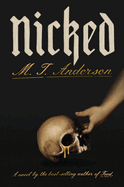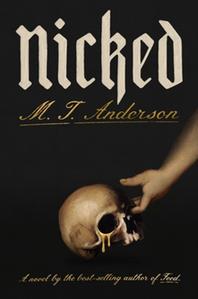
 The cleverness of this page-turner begins with its title, Nicked. It triples as the book's central action, the object of the theft, and the humble monk whose dream sets the chain of events in motion.
The cleverness of this page-turner begins with its title, Nicked. It triples as the book's central action, the object of the theft, and the humble monk whose dream sets the chain of events in motion.
National Book Award-winning author M.T. Anderson (Feed; The Assassination of Brangwain Spurge), making his adult debut, sets the stage with eerily modern elements for this 11th-century tale set in Italy and based on true events. Invaders and a pox are rapidly spreading throughout the land, making some people gravely ill, and the rest fearful of going out. This is certainly the case in Bari, where Nicephorus serves in the Benedictine monastery: "In an age of sickness; in a time of rage; in an epoch when tyrants take their seats beneath the white domes of capitals." Bari "sat at the heel of Italy, the crossroads of the Mediterranean," a stop for many soldiers, sailors, and traders.
As the novel opens, the Archbishop of Bari has instructed Nicephorus and his brothers to pray to St. Nicholas for healing and guidance. Nicephorus has a dream: "In the dream, the saint told me we cannot wait," he tells the abbot of his monastery. "We must leave our nest." The abbot conveniently interprets the dream as the saint's wish to have his remains moved from Myra, where St. Nicholas had served as bishop, to Bari. Thousands of pilgrims visit the saint, bringing wealth to the village. The saint's body "weeps an ichor" with healing properties that the abbot could use to cure the pox.
Nicephorus, who "had an irritatingly pure and generous heart," thinks the abbot's made quite a leap of logic. He goes about his day and wheels an invalid to the wharf, where a "dog-headed man on a ship" has been spotted. With the cynocephale, called Reprobus, is a Tartar, boasting of having retrieved "a phial of the seed of Adam" from the East. He is Tyun, the "saint hunter." Tyun's boasting contrasts comically with Nicephorus's compulsion for truth-telling. Soon the two form an unlikely alliance as part of the Norman-led team that attempts to reach Myra and pilfer the saint's bones before the Venetians can. (Bari offered to pay Tyun twice what the Venetians promised him.)
Anderson humorously exploits the polar-opposite qualities of Tyun and Nicephorus, as well as the blind spots of power-hungry leaders. A young, prideful Venetian prince jockeys for position with the "heavily chiseled Norman" who leads Bari's charge. The author flirts with blasphemy--Tyun's speculations about the source of St. Nick's healing "ooze" ("I suspect the sarcophagus has a cock.... A spigot"), the sisters' indulgence in sins of the flesh at the nunnery where Tyun and Nicephorus take refuge, and Nicephorus's growing attraction to Tyun.
But alongside the humor and tension, Anderson plumbs questions of what constitutes as faith, and the circularity of human history: "[T]he victory feast of one creature, he knew well, was always the corpse of another," reflects Reprobus. The tale ends with a delectable twist and a tantalizing possibility of further relic hunts. --Jennifer M. Brown, reviewer
Shelf Talker: NBA-winning author M.T. Anderson's humorous, suspenseful adult debut, inspired by an actual 11th-century heist of St. Nicholas's remains, deftly demonstrates the circularity of human history.

